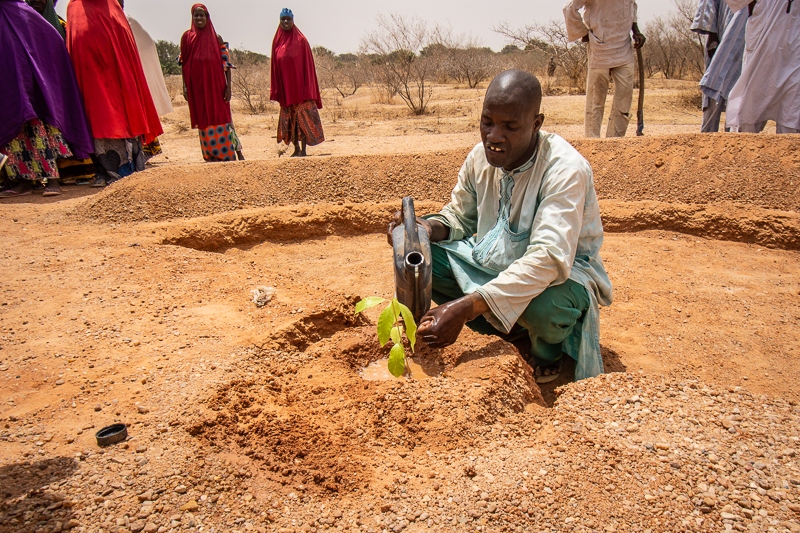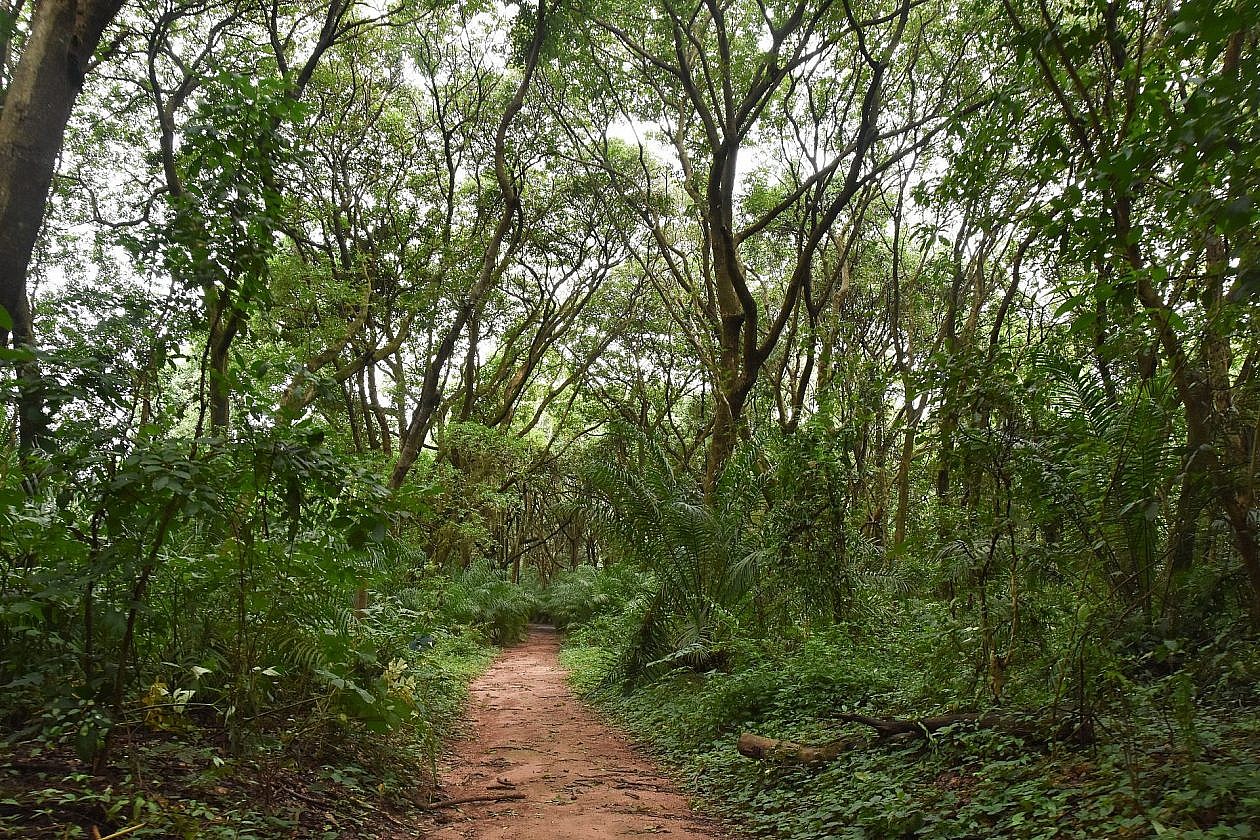Joint mobilisation for climate-resilient development in the Sahel
Environmental degradation and climate change threaten people’s livelihoods, impact the potential for economic growth, social cohesion, and the security and stability of the region. On May 18, during an event organized within the framework of the COP15 to the United Nations Convention to Combat Desertification, the Sahel Alliance, the Great Green Wall Accelerator and the Global Green Growth Institute (GGGI) reiterated their commitment to inclusive, income-generating and resilient rural development. The 3 organisations are committed to strengthening cooperation.
On the African continent, the Sahel is one of the regions hardest hit by climate change. Indeed, the consequences lead to a degradation of arable land exacerbating the fragilities of a region already plagued by extreme poverty and food insecurity. These lands are essential to the survival of more than two out of three Sahelians.
The Great Green Wall and the GGW Accelerator
A flagship initiative of the African Union launched in 2007 to combat the effects of climate change, desertification and food insecurity, the Great Green Wall has gradually been transformed into a broader land restoration and rural, economic and social development process. It now aims to identify and provide efficient solutions to the populations in the face of increasing environmental threats related to climate change, land degradation and biodiversity loss, and thus significantly improve their living conditions. Nevertheless, the Implementation Status and Prospects Report on the Great Green Wall to 2030 highlights the slow progress of the initiative and the insufficient objectives achieved.
The Great Green Wall Accelerator, hosted by the United Nations Convention to Combat Desertification (UNCCD), was designed to support the Pan-African Agency for the Great Green Wall. Its objective: to boost the implementation of projects and mobilise new financial resources with the aim of achieving 100 million hectares restored, 250 million tonnes of carbon mitigated and 10 million jobs created by 2030.
Placing rural development, restoration and land fertility at the heart of their actions, the Sahel Alliance, the Great Green Wall Accelerator and the Global Green Growth Institute (GGGI) organized on 18 May a meeting within the framework of the 15th Conference of the Parties (COP) to the United Nations Convention to Combat Desertification (UNCCD).
The three co-organisers agree that environmental degradation and climate change threaten people’s livelihoods, impact the potential for economic growth, social cohesion, and the security and stability of the region.
The achievement of the Great Green Wall and its objectives, such as land restoration, the resilience of populations and food production systems, as well as the implementation of sustainable agriculture that generates employment and income, constitute a major leverage effect for economic and social development in the Sahel.
In his speech, Adrien Haye, Coordinator of the Sahel Alliance, recalled that “The Sahel is a land of opportunities and potentials. The Great Green Wall can and must contribute to their realisation. […] Investments within the framework of the Great Green Wall can bring substantial dividends in view of the multiple potentials, the demographic growth of the Sahel and the youth of its population.“
“The development of a long-term low-carbon strategy is a necessary tool to combat desertification and land degradation“, said Olola Vieyra, GGGI Côte d’Ivoire Resident Representative. “Since 2012, GGGI has been providing instrumental support to its member countries to develop long-term, low-carbon development strategies, which have contributed to land recovery and reforestation in Great Green Wall countries such as Ethiopia and Burkina Faso.“

Successful examples that contribute to climate change adaptation
After the opening remarks, a technical session highlighted success stories through large-scale programmes and initiatives by the GGGI and some members of the Sahel Alliance, which contribute to climate change adaptation for the most vulnerable populations, through more sustainable agricultural techniques, better management of natural resources and community resilience.
Examples of Sahel Alliance projects
- Germany provides financial support to the African Union’s African Forest Landscape Restoration initiative (AFR100) to rehabilitate 100 million hectares of degraded land in Africa by 2030. Among many targets the initiative contributes to domestic commitments, the Bonn Challenge, a global commitment to restore 150 million hectares of land around the world by 2020, the New York Declaration on Forests that extends the Bonn Challenge to 350 million hectares by 2030 and the African Resilient Landscapes Initiative (ARLI), an initiative to promote integrated landscape management.
- The Soil Protection and Rehabilitation for Food Security programme, co-funded by Germany and the European Union and supporting partners and governments in the implementation of agricultural and land rehabilitation strategies. This initiative has protected or rehabilitated 500,000 hectares of land.
- The Green Climate Fund programme Scaling up Resilience in Africa’s GGW, led by the FAO proposes to carry out an urgent and major paradigm shift in 6 countries which are extremely vulnerable to climate change (Burkina Faso, Chad, Mali, Niger, Nigeria and Senegal) within the African Union’s Great Green Wall initiative, by removing barriers to heightened resilience and greater mitigation, through: (1) scaling-up of successful restoration practices with native species; (2) supporting the development of climate-resilient, low emission value chains of non-timber forest products in support of vulnerable communities’ livelihoods, and (3) strengthening the Great Green Wall’s regional and national institutions.
- The initiative Scaling up large-scale land restoration and resilient livelihoods in Africa’s GGW, led by the FAO, WFP and other UN agencies as part of the UN Integrated Strategy for the Sahel.
- The Action Against Desertification project, in collaboration with the African Union, the European Union, the OACPS, Turkey and other partners, supports the expansion of the Great Green Wall in 10 countries: Burkina Faso, Eritrea, Ethiopia, Gambia, Mali, Mauritania, Niger, Nigeria, Senegal and Sudan, with the aim of restoring degraded land and introducing more sustainable management of fragile ecosystems.
Greater synergies
Following these discussions, the speakers formulated some recommendations for concrete actions to promote greater synergies and enable an acceleration of the Great Green Wall’s achievements, such as:
- the introduction of a monitoring and evaluation system to assess the progress made by GGW projects
- the implementation of a dual Alliance Sahel-GGW labelling system
- the establishment of an incentive framework for taking into account the effects of climate change (promotion of agroecology, renewable energies, insurance against climate-related risks) in sectoral policies aimed at strengthening resilience
- an increase in the budget of the Ministries in charge of the Environment
- the quest for various avenues of cooperation and partnership between development partners in order to effectively and coherently address the needs of the population affected by climate change and desertification.

This event is the concrete expression of the rapprochement between the Sahel Alliance and the Great Green Wall Accelerator, in the light of the commitments made in the joint declaration adopted by the Alliance and the UNCCD on the occasion of the 3rd General Assembly of the Sahel Alliance held in Madrid on 4 April 2022.
The Sahel Alliance, the UNCCD and the GGGI are committed to strengthening cooperation, both at an institutional and operational level, in particular through the space for dialogue and coordination offered by the Sahel Alliance to strengthen cooperation between partners on the ground, and thus increase the impact of projects in favour of the Sahelian populations.
Go further

